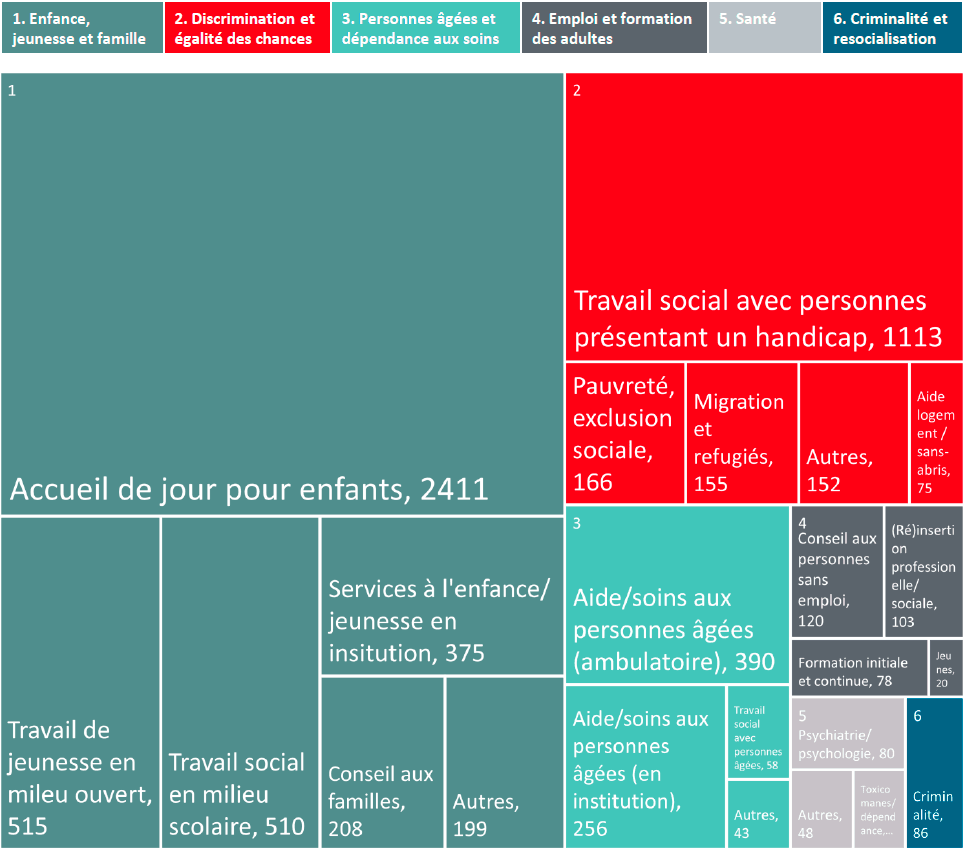
Social work jobs in Luxembourg
Social workers assist individuals or groups facing economic, administrative, family, work-related, housing, health, social, or psychological challenges. In the following article, we will share the details about getting a job in this field in Luxembourg.
The primary objective of a social worker is to provide tailored assistance to individuals based on their difficulties, helping them achieve autonomy and facilitating their social and/or professional integration. Due to the increasing precarity, aging population, and the complexity of support systems, the demand for local social services is on the rise.
What is the job of a social worker?
A social worker helps people or groups who have different kinds of problems. These can be about money, work, family, living situations, health, or feelings. They deal with many issues, like debt, family violence, taking care of children, and finding a place to live. Their main goal is to give the right kind of help for each person's situation, help people do things on their own, and make it easier for them to be part of society or work again.
The specific tasks of social workers depend on the structure in which they work and the individuals they assist. For instance, working in an adoption center differs significantly from supporting a person with disabilities in their professional integration.
Tasks may include conducting interviews with individuals in distress, identifying possible solutions, providing support and advice, informing individuals of their rights, defining services to help them, liaising with relevant partners, and monitoring the progress of cases through individual or group meetings.
Beyond direct assistance, social workers are also engaged in substantial administrative work, including regulatory compliance, dossier management, report creation, and statistical analysis.
Social workers may specialize in specific areas such as school health, child welfare, substance abuse, or domestic violence. They may find themselves responding to emergencies, addressing issues like domestic violence, child abuse, or other critical scenarios.
Requirements and training needed to work as a social worker in Luxembourg
Aspiring social workers in Luxembourg undergo a comprehensive education that not only equips them with theoretical knowledge but also hone their practical skills. The combination of formal education and the development of these essential skills prepares individuals to address the diverse and complex needs of the community effectively.
Read article
In Luxembourg, aspiring social workers must complete a Professional Bachelor's program in Social and Educational Sciences. This comprehensive three-year curriculum, offered by the University of Luxembourg, integrates theory and practice. Students embark on two internships of 6 and 14 weeks during the 3rd and 6th semesters. The program provides a robust theoretical foundation in social sciences while allowing students to specialize in areas like disability and non-discrimination, migration, interculturality, and diversity.
What you learn during the course?
The curriculum encompasses diverse subjects such as sociology, psychology, information and communication sciences, and education sciences. Additionally, students delve into legislation, social policies, law, and social ethics.
Where to study?
If you already have a degree?
Prospective social workers must gain the right to practice the profession by successfully completing an aptitude test on Luxembourgish social law.
To register for this test you need to
- Check the dates
The exams are held twice a year, and specific dates are available on the dedicated page of the Ministry of Research and Higher Education.
- Pay the fee
Participation in the exams requires the prior payment of a participation fee amounting to 300 euros. This fee should be transferred via bank transfer to the following account:
- IBAN: LU36 0019 5955 4436 2000
- BIC: BCEELULL
- Payee: Administration de l'enregistrement, des domaines et de la TVA
- Reference: MESR, professional health recognition, aptitude test registration "profession," applicant's name, date of the request
- Complete the registration
To register, submit a participation request via email to rqp@mesr.etat.lu, clearly stating the intended profession and attaching proof of payment for the participation fee.
For more detailed information, it is recommended to refer to the dedicated page on the Ministry of Research and Higher Education's website.
What types of positions can be found and are in-demand in the social area?
In the field of social work, there are various specializations or sub-areas, each playing a unique role in addressing societal needs. Let's examine some of the most important roles.
Read article
Available jobs in social work field in Luxembourg










What sub-areas are most in demand in the field of social work in Luxembourg?
Due to the rising precarity, aging population, and the intricacies of support systems, the demand for local social services is notably high. To delve into specific areas of demand, we turn to a sectoral study conducted by the Ministry of Labour (MT) and the Employment Development Agency (ADEM) covering the period from 2019 to 2021.

This study highlights the number of declared positions by domain and sub-domain within the social action field. According to the findings, the domain of childhood, youth, and family claims the top spot, representing over 59% of declared positions. More than half of these positions are dedicated to child daycare. The domain of discrimination and equal opportunities follows closely in the second position, constituting 23% of declared positions, with a significant focus on social work with individuals with disabilities. The domains of elderly care and dependency (10%), adult employment and training (4%), health (2%), and crime and resocialization (1%) follow suit.
What is the best way to start a career in social work in Luxembourg?
The surest method that will not only provide you with employment, but also the opportunity for further growth and residency in the country, is to pursue higher education. The University of Luxembourg is known for its multinationality, advanced research areas and nearly free public education.

Blog article on studying in Luxembourg as a student
Where to find a job in the social work field in Luxembourg?
If you're passionate about social work and wondering where to find social work jobs in Luxembourg, we've got you covered. In this section, we will explore the top job portals and discover the best places to secure employment in Luxembourg.
Luxembourg establishments recruiting social workers
While the number of biology-related job offerings in Luxembourg is limited, several notable companies actively recruit in these areas.




Job portals offering vacancies in Luxembourg
To navigate the job market efficiently, the internet is your best ally, hosting numerous job portals with thousands of job listings. These platforms allow you to filter job offers based on your preferred sector, location, educational level, or required work experience.


Freelance option in social work
Freelancing is not a common practice in the social work field primarily due to economic factors. Social work often involves providing essential services that are traditionally funded by organizations, institutions, or government entities. The nature of social work requires a stable and consistent source of funding to ensure ongoing support for individuals and communities. Freelancing may pose challenges in maintaining financial stability and the ability to offer sustained assistance, making it less prevalent in the social work domain.
What else can you read on the topic of employment in Luxembourg?
You will find a variety of articles on the job search, career development and workplace culture in our dedicated section of the Blog. Check it out.
Salaries of social workers in 2024
According to talent.com, the average salary for a social worker in Luxembourg is 42,000 euros. Entry-level positions start at approximately 34,944 euros per year, while seasoned professionals can earn up to 80,000 euros annually.
What papers do you need as a foreigner?
For European nationals, the process of working in Luxembourg is relatively straightforward, given the freedom to live and work in any European country. However, if you are not a European national, navigating the paperwork becomes essential.
The requirements vary based on your circumstances, distinguishing between employed and self-employed roles. Additionally, familial situations, such as having a Luxembourgish or European partner, can impact the process.


Work permit in Luxembourg
Frequently Asked Questions (FAQ)
What is the role of a social worker in Luxembourg?
Social workers in Luxembourg play a crucial role in assisting individuals or groups facing diverse challenges, including economic, administrative, family, professional, housing, health, social, or psychological issues. They aim to provide tailored support, fostering autonomy and facilitating social and/or professional integration.
What training and skills are required to work as a social worker in Luxembourg?
To work as a social worker in Luxembourg, a professional bachelor’s degree in social and educational sciences is essential. This three-year program, offered by the University of Luxembourg, combines theoretical knowledge with practical experience through internships. Social workers also need a range of skills, including empathy, organizational abilities, open-mindedness, effective communication, patience, and persuasive talents.
What are the requirements to work as a social worker in Luxembourg?
The profession of social worker in Luxembourg is regulated, requiring a bachelor’s degree in social and educational sciences or an equivalent qualification obtained elsewhere. International degrees need recognition by the Ministry of Higher Education and Research. Additionally, individuals must pass an aptitude test on Luxembourgish social law.
Which sub-areas are most in demand in the field of social work in Luxembourg?
Source: www.hellowork.com, www.quali-sante.com, fr.indeed.com, beruffer.anelo.lu, www.uni.lu, mesr.gouvernement.lu, guichet.public.lu, adem.public.lu, www.studyrama.com, www.servicesalapersonne.gouv.fr, www.quali-sante.com, www.cidj.com, www.onisep.fr, www.cidj.com, www.servicesalapersonne.gouv.fr, www.onisep.fr, www.onisep.fr, solidarites.gouv.fr, en.moovijob.com, fr.wikipedia.org, www.croix-rouge.lu, en.moovijob.com, www.moovijob.com, lu.talent.com
We took photos from these sources: Unsplash, ADEM, Moovijob